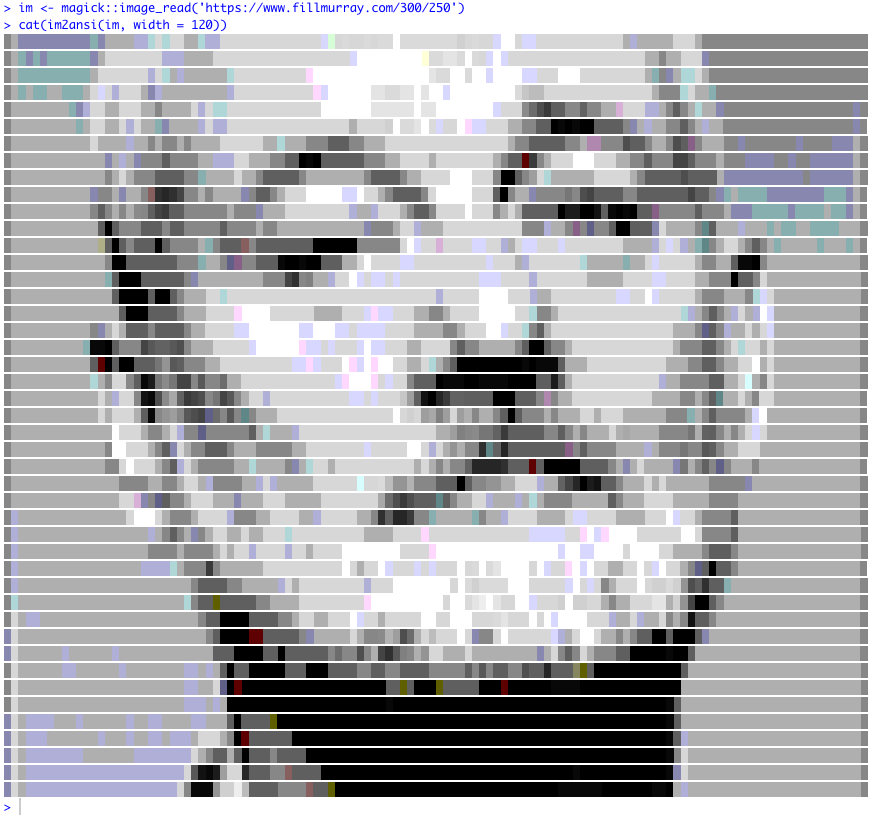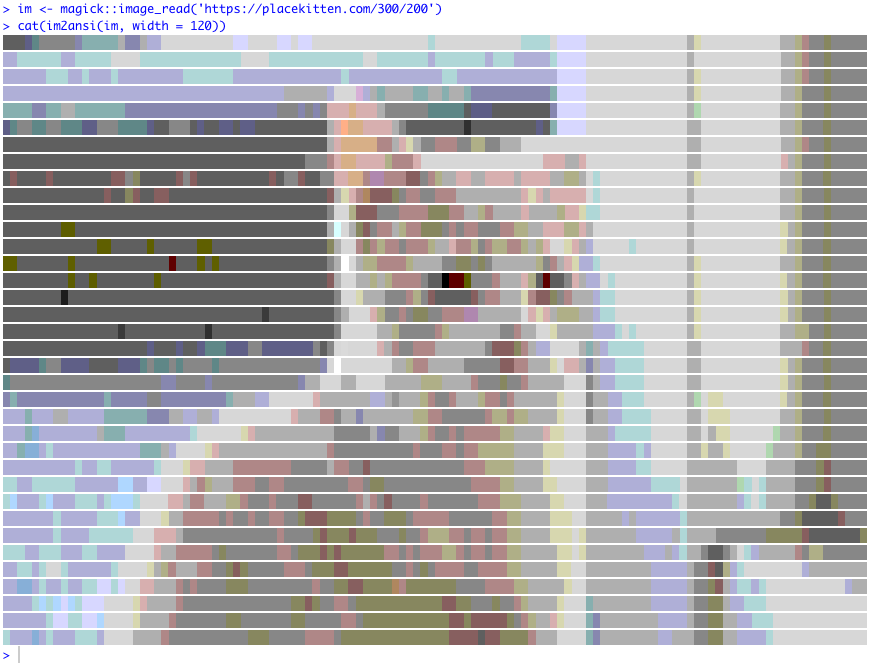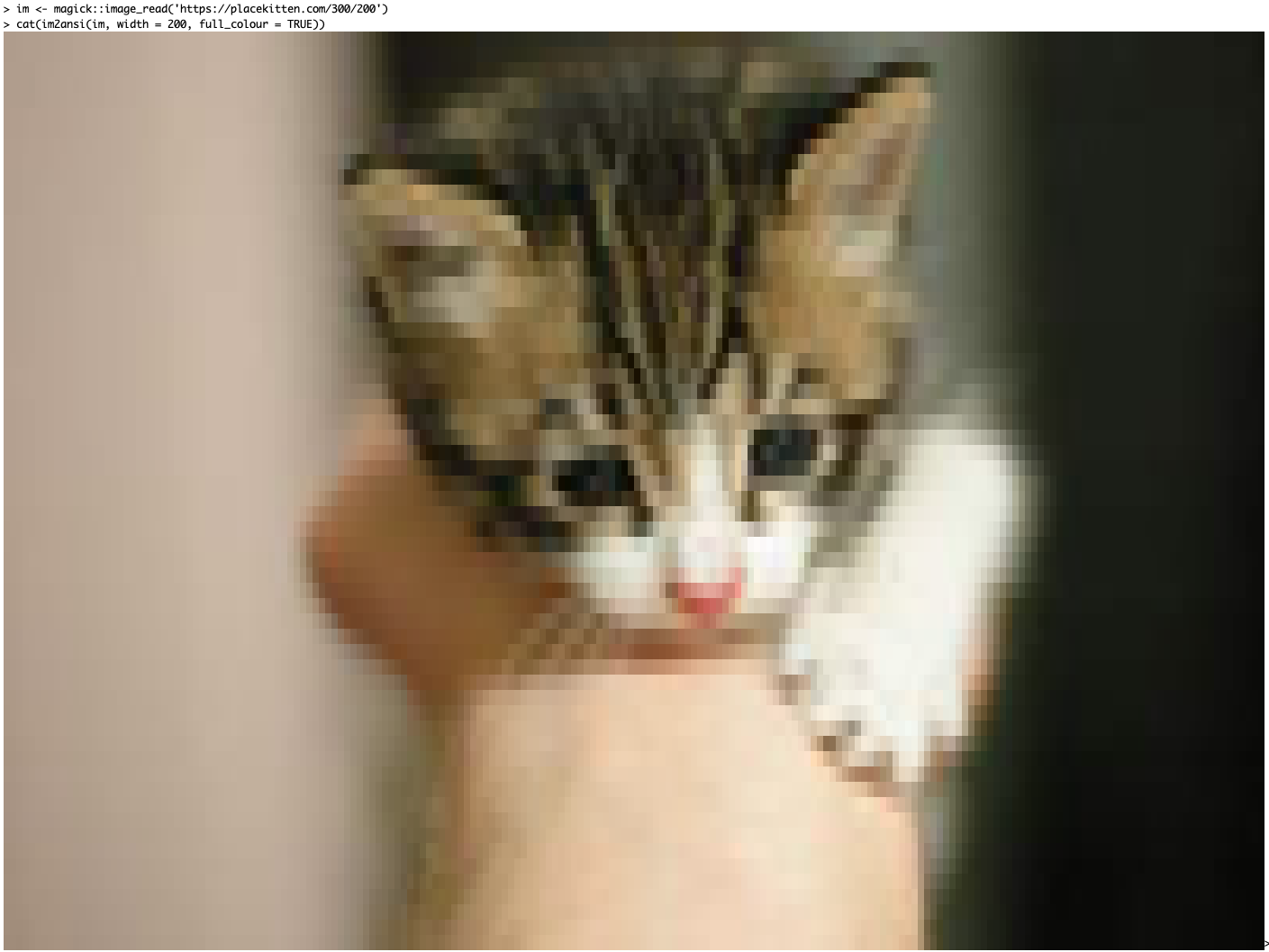ransid converts images to 256-colour ANSI text which can be displayed
in the console.
24bit ANSI is also available, but it is not supported by Rstudio console.
Some great R packages for ANSI handling that eclipse what this humble package does:
- crayon the great, useful and well-designed ANSI package by Gábor Csárdi and Brodie Gaslam
- fansi Brodie Gaslam’s comprehensive set of utilities for wrangling strings containing ANSI escape sequences.
You can install ransid from
github with:
# install.packages('remotes')
remotes::install_github("coolbutuseless/ransid")Note - because ANSI is for display in a terminal, it does not render in a markdown document. The following images are screenshots of my Rstudio terminal
im <- magick::image_read(system.file('img', 'Rlogo.png', package = 'png'))
cat(im2ansi(im, width = 120))im <- magick::image_read('https://www.fillmurray.com/300/250')
cat(im2ansi(im, width = 120))im <- magick::image_read('https://placekitten.com/300/200')
cat(im2ansi(im, width = 120))24bit colour ANSI is enabled by setting full_colour = TRUE
24bit ANSI colour has more limited support (compared to 8bit ANSI), and will not display in Rstudio.
It will however work in iTerm on OSX, KDE Konsole, Xterm, libvte-based
terminals such as GNOME Terminal. See the wikipedia
page for more
information
im <- magick::image_read('https://placekitten.com/300/200')
cat(im2ansi(im, width = 200, full_colour = TRUE))Lower level functions are also available.
col2bg,col2bg24- create an ANSI sequence for a particular background colour (8bit and 24bit versions)col2fg,col2fg24- create an ANSI sequence for a particular foreground colour (8bit and 24bit versions)im2char- the matrix corresponding to the image, where each element represents one pixel
col2bg('tomato')
#> [1] "\033[48;5;209m"
paste0("Hello ", col2bg("tomato"), "#RStats", reset_code)
#> [1] "Hello \033[48;5;209m#RStats\033[39m\033[49m"cat(paste0("Hello ", col2bg("tomato"), "#RStats", reset_code), "\n")col2fg('darkgreen')
#> [1] "\033[38;5;28m"
paste0("Hello ", col2bg('tomato'), col2fg('darkgreen'), "#RStats", reset_code)
#> [1] "Hello \033[48;5;209m\033[38;5;28m#RStats\033[39m\033[49m"cat(paste0("Hello ", col2bg('tomato'), col2fg('darkgreen'), "#RStats", reset_code), "\n")im <- image_read(system.file('img', 'Rlogo.png', package = 'png'))
char_matrix <- im2char(im)
char_matrix[1, 1:10]
#> [1] "\033[48;5;231m " "\033[48;5;231m " "\033[48;5;231m " "\033[48;5;231m "
#> [5] "\033[48;5;231m " "\033[48;5;231m " "\033[48;5;231m " "\033[48;5;231m "
#> [9] "\033[48;5;231m " "\033[48;5;231m "col2bg24('tomato')
#> [1] "\033[48;2;255;99;71m"
paste0("Hello ", col2bg24("tomato"), "#RStats", reset_code)
#> [1] "Hello \033[48;2;255;99;71m#RStats\033[39m\033[49m"cat(paste0("Hello ", col2bg24('tomato'), col2fg24('darkgreen'), "#RStats", reset_code), "\n")






